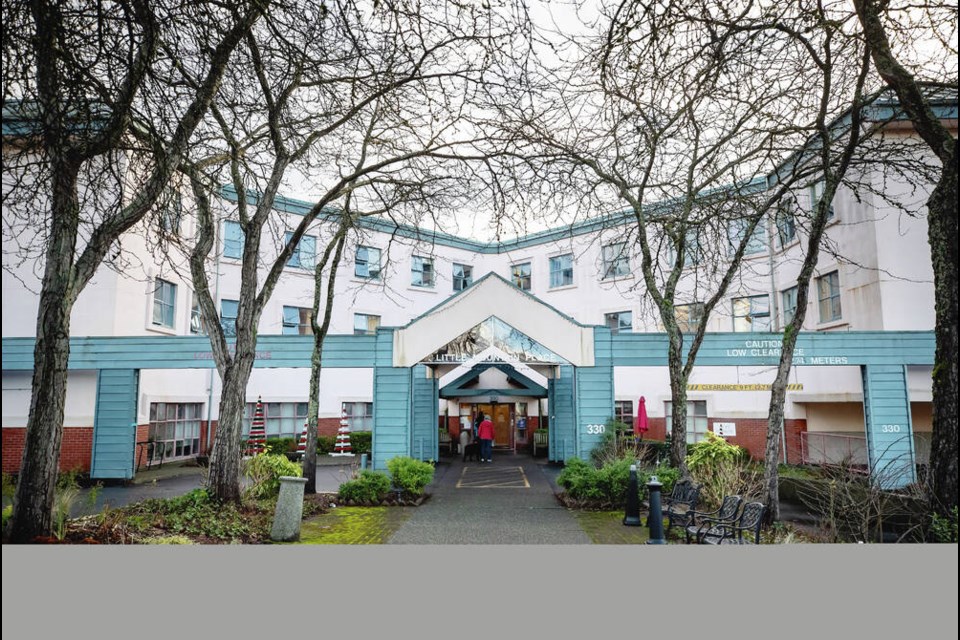B.C.’s seniors advocate is calling for increased sick pay for care-home staff, hiring of more nurses, elimination of shared rooms, and increased COVID testing during outbreaks, after a review of 365 COVID outbreaks at 210 seniors homes over a one-year period.
Isobel Mackenzie said the recommendations are geared toward “things we can do right now,” rather than the issue of whether health authority-operated sites fared better in outbreaks than sites operated by private companies or non-profits.
The review focused on factors leading to COVID outbreaks from March 2020 to February 2021, most of them in long-term care, with just 13 per cent in assisted living.
“It is seniors, particularly those who live in long-term care and assisted living, that have felt the deepest personal impact, as they are so disproportionately at risk of serious illness and death from COVID,” Mackenzie said as she released the report Wednesday.
The majority of outbreaks in B.C. were contained and did not result in any COVID-19 deaths because of the “herculean efforts” of staff, site operators, public health officials and the provincial government, which early in the pandemic “took decisive actions to blunt the impact of COVID-19 in long-term and assisted living in B.C.,” Mackenzie said.
Despite “everyone’s best efforts,” however, about 800 residents died of COVID-19, she wrote. Mackenzie said researchers traced the first COVID case in each facility, how the facility was notified and the testing directed by public health.
Factors determining whether the outbreak was large or small included the amount of paid sick leave provided by a site, the level of registered nursing staff, and the timeliness of testing, she said.
Sites with a higher proportion of registered-nurse hours for direct care — typically health authority-owned sites — were more likely to experience a contained outbreak, while sites with a lower proportion of nurse hours — typically contracted for-profit and not-for-profit facilities — were more likely to experience a larger outbreak, the report said.
The earlier testing was done, the more likely an outbreak was to be contained. While most rooms are single occupancy, 10 per cent are shared rooms, mostly in health authority-operated long-term care homes. Shared rooms influenced the likelihood of having a larger outbreak.
The report said four out of 10 staff in long-term care and assisted living were casual staff. “Almost nobody provides paid sick days for casual staff,” said Mackenzie. “The impact of this on transmitting COVID-19 and other infectious diseases and illness is pronounced.”
About 40 per cent of staff surveyed said that on at least one occasion, they came to work when not feeling well so as not to burden other staff and because of potential lost pay. Staff need to be supported financially if they remain at home when ill, Mackenzie said.
B.C. Health Minister Adrian Dix said Wednesday some recommendations in the report are “actively happening,” pointing to funding announced last year to hire 7,000 health care workers, including 5,000 care aides, and a province-wide standard for paid sick leave to be introduced in January. As well, new facilities require single rooms, and shared rooms in existing facilities are being reduced. “We’ve taken a lot of steps in the last few years … to improve staffing and supports for long-term care but I believe we still need to take action to improve the quality of life in long-term care.”
Staff and residents of long-term care homes were almost three and a half times more likely to contract COVID-19, and residents were 32 times more times likely to die from it, the report said. Visitor restrictions left seniors feeling isolated and staff saw “exponential growth” in their workload and stress.
Most outbreaks, 261 of 365, were small and limited to four or fewer cases. Seventy-five per cent of outbreaks had no COVID-19 fatalities.
Seventy-six per cent of sites that experienced an outbreak reported that the first case was in a staff member — 52 per cent of those first cases were care aides and 12 per cent were nurses.
In 22 per cent of outbreaks, the first reported case was in a resident. Twelve per cent of those were transferred into long-term care from hospitals, but in the remainder, it’s likely that the virus was in the facility and transmitted by asymptomatic staff with COVID, Mackenzie said.
Just one case, less than one per cent, was brought in by a visitor, but visiting restrictions that began in March 2020 were in effect for more than a year.
Across the province, health-authority-operated facilities saw fewer COVID-19 cases per 1,000 beds — 81 — than for-profit facilities at 146, and not-for-profit facilities at 153.
While the Lower Mainland has 45 per cent of B.C.’s long-term care and assisted-living sites, it experienced 84 per cent of the outbreaks, which is linked to higher community transmission.
B.C. Care Providers Association president Terry Lake said during the pandemic’s second wave, Fraser Health had the most community spread. It also has the most contracted sites and the most for-profit sites. “There’s correlation there, but I think we have to be very careful about making a causative statement because the biggest factor is virus in the community.”
In the third and fourth waves, outbreaks were worse in health-authority-operated sites in Northern Health and in Kelowna in Interior Health, Lake said. As for the higher ratio of nurses in public facilities, Lake said they have a competitive edge in the pensions they offer, and nation-wide, “there’s just no nurses available.”
Of 39,853 long-term care and assisted-living beds in B.C., Island Health operates 8,426 or 21 per cent.
Both public and private facilities in the Island Health region had far fewer staff and resident cases per 1,000 beds than any other health authority — 2.6 cases per 1,000 compared with the similarly sized Northern Health region with 93.8, and 197 per 1,000 in Fraser Health.



